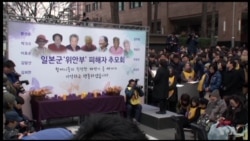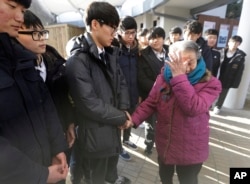The World War II sexual slavery settlement reached between Japan and South Korea was met with sharp criticism Wednesday as some surviving Korean "comfort women” and hundreds of supporters protested the agreement at a rally in Seoul.
Even though Tokyo agreed to Seoul’s demands for a formal apology and compensation, some victims and their supporters said it does not go far enough to compensate for past atrocities.
It is estimated that over 200,000 women throughout the Pacific region were forced into prostitution by the Japanese military during the World War and Japan’s colonization of Asia.
In South Korea only 46 survivors remain of the 238 women who came forward, and their average age is 89.
For the last 23 years “comfort women” supporters have held weekly demonstrations across from the Japanese Embassy in Seoul to condemn Japanese wartime atrocities and demand an official apology and compensation for the victims.
At this week’s rally 87-year old former comfort women Lee Yong-soo condemned South Korea for agreeing to settle their longstanding grievance with Japan.
“Lie, lie and lie. Why is our government trying to kill us twice and three times with Japan?” questioned Lee Yong-soo.
Japan’s apology ‘ambiguous’
In the bilateral agreement reached earlier this week, Japanese Prime Minister Shinzo Abe offered an apology statement and Tokyo agreed to contribute about $8.3 million to a victims fund.
The Japanese prime minister offered “apologies and remorse” for “immeasurable and painful experiences” and “incurable physical and psychological wounds.”
But for critics of the deal, Abe’s apology statement was not specific or convincing enough. He did not acknowledge the extent of official Japanese military involvement in the forced prostitution program nor detail the specific atrocities committed by the Japanese military.
“In the Japanese government’s apology, it said Japan is responsible for this matter, but the expression is ambiguous,” said protester Kang Min-soo
They also said that allowing Japan to call the $8.3 million payment a contribution or donation versus official compensation reduces Japan’s legal responsibility for it past misconduct.
“The Japanese government is trying to end everything with these talks, and is not trying to sincerely repent and remember its faults,” said Jang Hong-Min at the rally.
Statue remains focal point
In the deal, Japan asked South Korea to remove a bronze “comfort woman” statue that is located across from the embassy.
Many Japanese officials consider the 1.5 meter statue at the site of the weekly rallies an affront to national dignity.
The protesters have vowed to resist any efforts to remove the statue that they say is a monument to the tens of thousands of sex slaves forced to serve the Japanese military. And they plan to continue to hold rallies demanding Japan make a proper atonement for its wartime past.
“How can we have a solution without the acceptance of the victims? It is a humiliating and an unspeakable act of our government, and none of our citizens endorse it,” said supporter Kim Ki-man.
South Korean officials also encountered anger and outrage from some “comfort women” they met with Tuesday to explain and defend the agreement. The Seoul officials noted that Abe for the first time offered a direct apology and offered some form of compensation. And they said Seoul wanted to secure a deal by the end of this year before more elderly “comfort women” pass away.
Japan has long maintained that all compensation obligations were legally settled in a 1965 diplomatic treaty normalizing relations between Japan and South Korea.
Both sides agreed that the settlement fully and irreversibly resolves the official dispute over the “comfort women” issue.
The two major Asian economies and U.S. allies also promised to improve ties and cooperation on regional security issues such as containing the threat from a nuclear North Korea.
Youmi Kim in Seoul contributed to this report.







